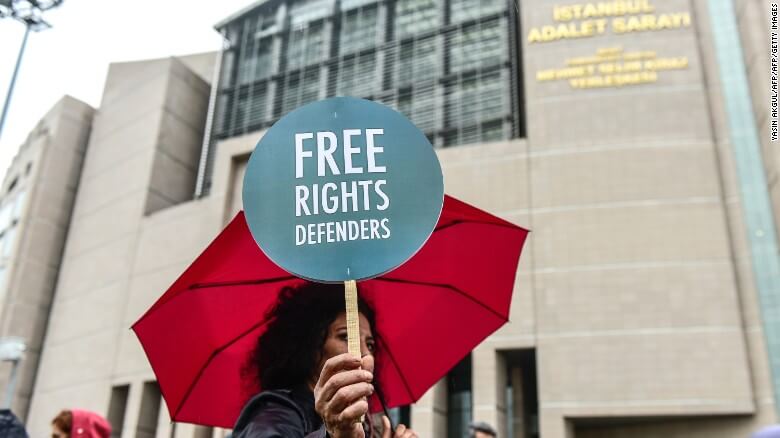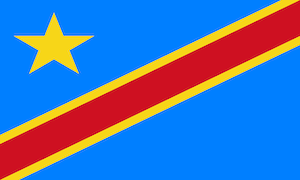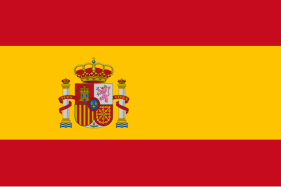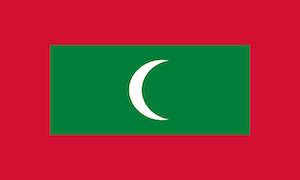October 27, 2017

Photo: Rights activists gathered in Turkey before the trial of other activists (REUTERS/Osman Orsal)

After Zimbabwean President Mugabe’s appointment as a WHO goodwill ambassador for non-communicable diseases last week had caused national and international criticism, the organization’s director Tedros Adhanom Ghebreyesus revoked the decision on Sunday. Reactions included surprise and disappointment, as critics stated that in contrary to Tedros’ statement on Zimbabwe prioritizing the issue of health in its policies, the country has faced a highly deteriorating health system. News24 also reported on Zimbabwe’s severe health situation and reactions after the WHO’s decision(s). The media outlet further wrote that Zimbabwe’s government declared Mugabe did not have notice of the appointment and would have declined anyway.
At the same time, there have been reports about ongoing intimidation and violence, especially by Zanu PF supporters against those in favor of the MDC, during the Biomentric Voter Registration (BVR) that started earlier this month. The NGO Election Resource Center (ERC) called on the Zimbabwe Electoral Commission (ZEC) to take actions against those parties and supporters hampering the process of registration in preparation for peaceful, free and fair election, wrote allAfrica on Wednesday.
Late last week, MDC leader Morgan Tsvangirai had taken further steps to form his alliance with five other opposition parties, announcing Welshman Ncube to be the new spokesperson. The alliance also established numerous natioal alliance committees, to create joint efforts especially for voter education and registration mobilization. Meanwhile, all Africa reported on MDC opposition spokesman Obert Gutu voicing his doubts about the ZEC’s capabilities and pointed out the likelihood of next year’s elections being rigged in favor of the ruling party. Gutu “suggested it was therefore important that the nation consider pushing forward the election until the voters’ roll is ready and other proposed electoral reforms have been addressed”, besides pointing towards current ill-preparedness of the opposition.

The UN recognized the Kasai, South Kivu and Tanganyika regions as Level 3 (L3) emergency territory, highlighting the graveness of the current humanitarian crisis. The only three other countries labeled L3 are Syria, Irak and Yemen. The Norwegian Refugee Council hopes that the labeling of L3 will attract much-needed financial support for the underfunded crisis, “having the highest increase of newly displaced in the world in the last year”.
Meanwhile, one of DRC’s key opposition parties, the Union for the Congolese Nation (UNC), announced on Monday to withdraw Pierre Kangudia Mbayi from the transitional government. Kangudia is currently serving as minister of state supervising budget. News24 writes that the UNC had stated it decided to pull out Kangudia “after “an evaluation of the level of implementation of the agreement’”, while lamenting the delay and non-organization of elections as well.
On Wednesday, Union for Democracy and Social Progress (UDPS) opposition supporters were released, after they had been dispersed with teargas and arrested on Sunday and Monday during a visit by opposition leader Felix Tshisekedi in Lubumbashi. “The releases followed diplomatic pressure in the form of a joint statement from EU officials and UN diplomats” from the US, Switzerland and Canada, wrote New Vision.

On Thursday, the EU Parliament announced the democratic opposition and political prisoners in Venezuela to be this year’s winners of the EU Sakharov Prize, which had been created in 1988 to honor defendants of human rights and fundamental freedoms. Through this decision the European Parliament “wanted to reward the courage of students and politicians fighting for freedom in the face of a repressive government”, reported the Independent.
The media has also been addressing concerns about a possible Venezuelan default, considering two due repayments of bonds this and next week, without having ‘grace periods’ for its payments. While the Financial Time reported of a Venezuelan Think Tank hinting at the country being able to pay, other experts have pointed out that a possible Venezuelan default could entail an even worse economic situation than already now. While sanctions had been imposed by the US, “Venezuelans continue to look to Russia for help”.
In the meantime, Human Rights Watch called on “international pressure to restore democracy” to continue after “Questionable elections in Venezuela” on October 15.

On Tuesday, Myanmar and Bangladesh signed an agreement for repatriating Rohingya who had come to Bangladesh back to Myanmar. So far, no details on the exact proceedings are known, and hundreds had protested in Rakhine, urging the Myanmar government not to repatriate the Rohingya. The US signaled on Monday that it was considering further action against Myanmar, following their treatment of the Muslim minority. There have been numerous reports about what the Rohyngia have been facing during this humanitarian crisis and especially women and girls have suffered. Médécins sans Frontiers accounted that more than half the girls treated after sexual assaults are under 18. Speaking to the Guardian, a leading Red Cross official warned the international community to take the situation seriously and that it was failing in its response so far. The South China Morning Post also reported on a large numbers of Rohingya women prostituted in overcrowded Bangladeshi refugee camps.

As a new round of Syrian peace talks have been scheduled for November 28th, a UN investigation found that Assad’s forces are responsible for a deadly sarin gas attack in Khan Sheikhun in April this year. New talks in Geneva are said to focus “on drafting a new constitution and holding UN-supervised elections in a country devastated by several overlapping bloody civil conflicts”, wrote the Guardian. US Secretary of State, Rex Tillerson, has stated that the United States do not see a role for Bashar al-Assad, or rather the whole Assad family, for the future of Syria. Russian UN ambassador Vassily Nebenzia, on the other hand, stated that “we should not pre-empt any future for anybody”.
While the US-backed coalition efforts against the Islamic State (ISIS) have captured Syria’s largest oil-field which had been in the hands of ISIS forces since 2014, a rising number of civilian deaths caused during coalition operations become also known. Moreover, reports have pointed out the devastating humanitarian situation in eastern Ghouta near Damascus, currently being blocked by the Syrian regime. As the regime has tightened its siege, basic supplies were not able to reach the region, leading to lack of food and medicine, causing a large number of infant death and general malnutrition.

This week, traditional and social media continued addressing the #MeToo campaign which reached the European Parliament on Wednesday, as a session in Strasbourg was addressing sexual harassment and assaults. Another topic which of interest in the US, was lawmakers deciding over the passing of a bill addressing child marriage in Florida, which is among the states with the highest child marriage rate in the US. A HRW article stated that for now, “Afghanistan has a tougher law on child marriage than Florida”, but also said that if passed, the new law would make Florida the first state to ban any marriage under 18. The first step was taken on Tuesday, when a Senate committee unanimously approved a bill. What caught attention on the federal level, were rising tensions within the Republican Party about Donald Trump, as two senators accused Trump of “debasing U.S. politics and the country’s standing abroad.” Via Twitter, Trump had been criticizing the two Republicans as well.
Causing new criticism, the US is now left as one of the only two countries, beside Syria, not having joined or signaled to join the Paris Climate Accord (anew), after Nicaragua had announced it would do so a few days ago. In June this year, President Trump declared the US would withdraw from the accord as it was, according to him, “excessively onerous and hampered American business”, wrote the New York Times. Nevertheless, US officials will be travelling to Germany next month for United Nations climate change discussions, “effectively putting them in the position of negotiating a deal they have said they are leaving.”

On Wednesday, Cambodia‘s Prime Minister Hun Sen pardoned a senator from the main opposition party CNRP from a seven-year jail sentence. The senator had been sentenced after a Facebook post last year. While the opposition welcomed this pardon, Hun Sen did not ease his stance on the CNRP, which he reiterated would be dissolved and those officials who defected to his party could stay in office.
The Economist published an article about foreign textile companies lobbying for Cambodia’s government to loosen its tightening labor laws. The government had been introducing stricter regulations throughout the last year, especially affecting the heavily unionized textile industry – Cambodia’s biggest. Activistst have stated that the foreign companies should acquire the sewing mills and make them into subsidiaries if really wanting to help on a greater scale. Regarding the struggle for land rights in the country, Reuters reported on Buddhist monks who are highly regarded within Cambodian society, taking a leading role in this issue.

Yesterday, Catalan leader Carles Puigdemont had been expected to call for new regional elections “to break the deadlock between Madrid and separatists”, wrote Reuters. However, Puigdemont did not, arguing that the government had not given sufficient guarantees to hold an election and eventually left further steps to the Catalan Parliament. Meanwhile, the Spanish Senate will decide on Friday on approving the government’s take-over of Catalonia’s institutions and provide them with the power to remover the Catalan president. Not only did Puigdemont’s move sharpen the political crisis which could possibly turn into direct confrontation, but it also further drove apart a divided Catalan independence movement.

The Committee to Protect Journalists (CPJ) reported on ongoing injustices against RaajjeTV station which had faced various fines under the Maldives’ controversial defamation act introduced last year. “Criminal defamation laws are often used as tool to jail journalists and silence dissent, particularly by authoritarian governments”, stated CPJ. Meanwhile, RaajjeTV asked for a review of two dimissed cases which they had filed earlier this month regarding a 2013 arson attack and a fine imposed by the Maldives Broadcasting board.
Kenya – Following confrontations between the police and protesters, part of Thursday’s re-run elections in Kenya were postponed until Saturday. Though most of the voting happened peacefully, at least three people had been killed yesterday. The contested elections with incumbent Kenyatta’s main opponent Odinga boycotting the vote, happened after the Supreme Court had been unable to hear a case that could have postponed the elections on Wednesday. – https://www.nytimes.com/2017/10/26/world/africa/kenya-elections-police.html
Poland – This week, a Human Rights Watch report drew new attention to Poland and how the ruling party has used its parliamentary majority to curb various human rights and the rule of law. In an article, a HRW researcher called on the EU to sanction Poland more harshly and trigger Article 7 (1) of the EU treaty which could result in the suspension of a member’s rights to vote on the Council. – https://www.hrw.org/news/2017/10/24/poland-dismantling-rights-protection
Hong Kong – Two Hong Kong activists who had been jailed in August for their involvement in the 2014 ‘umbrella movement’, were released on bail at the beginning of the week. On Thursday, a lower Court of Appeal rejected their appeals to jail terms, but they had already filed a separate case directly at the Court of Final Appeal scheduled to hear their case on November 7th. – https://www.scmp.com/news/hong-kong/law-crime/article/2117122/hong-kong-court-rejects-appeal-bids-two-jailed-occupy
Turkey – This week, international attention focused on court trials being held in Turkey. Eleven human rights activists, one Swede, one German and nine Turks, had been detained and remained in prison for several months, causing widespread European criticism. Charges against them included having connections to “terrorist organizations” such as the Gulen group and Kurdish separatist factions. As the trial continues, two activists had been released on bail prior to the trial and eight of them were released from prison in Istanbul this Wednesday, while one remained in prison in Izmir.
https://www.reuters.com/article/us-turkey-security-rights/turkish-court-releases-eight-rights-activists-on-bail-in-terrorism-trial-idUSKBN1CU0BM
https://www.aljazeera.com/news/2017/10/amnesty-turkey-chair-taner-kilic-remanded-custody-171026142521574.html
Vietnam – This week, a Vietnamese student was convicted “for propaganda against the state” criticizing the government online, and now faces six years of prison plus four years of probation, reported Reuters. Citizens have been facing tight media censorship and intolerance of criticism by the government. Human Rights Watch also called on Vietnam to release the student and drop all charges against him, while a Vietnamese lawyer stated the proof being vague. – https://www.reuters.com/article/us-vietnam-dissident/vietnam-jails-student-activist-six-years-for-propaganda-against-the-state-idUSKBN1CU11D
Iraq – On Wednesday, Kurdish authorities offered to put a hold on the independence referendum’s result and proposed an immediate ceasefire to start dialogue with the Iraqi federal government. However, an Iraqi military spokesman suggested the military offensive would continue. The Iraqi Prime Minister had called on the Kurds to cancel the referendum’s outcome for good as a pre-condition for talks. – https://www.reuters.com/article/us-mideast-crisis-iraq-kurds-referendum/kurds-offer-to-suspend-independence-drive-seek-talks-with-baghdad-idUSKBN1CT37M
China – At the end of China’s quinquennial Communist Party Congress, President Xi Jinping further consolidated his power, the party elevated him “to the same exalted status as the nation’s founder, Mao Zedong” and there was no introduction of a younger member as a potential predecessor in the reshuffled Politburo Standing Committee, as had been an unwritten convention in past years. Some have speculated that this could indicate Xi Jinping’s aspirations to continue dominance after the next five-year term, or to further assess possible successors. – https://www.nytimes.com/2017/10/24/world/asia/xi-jinping-china.html